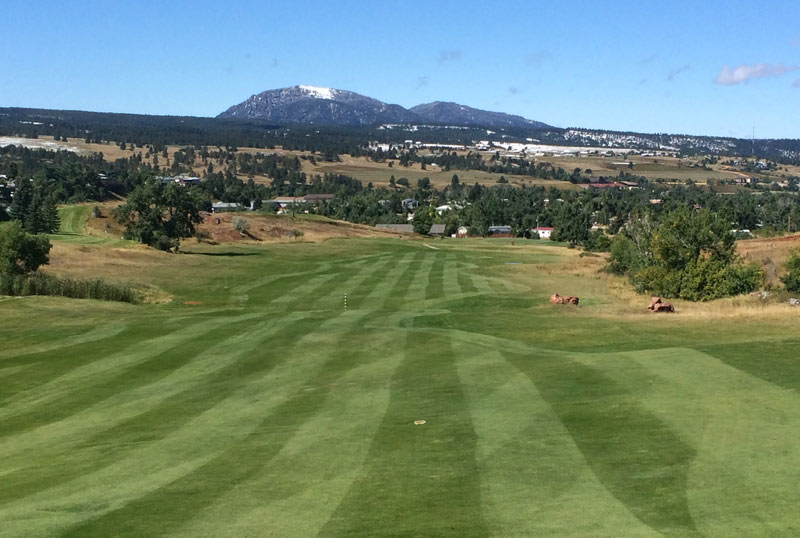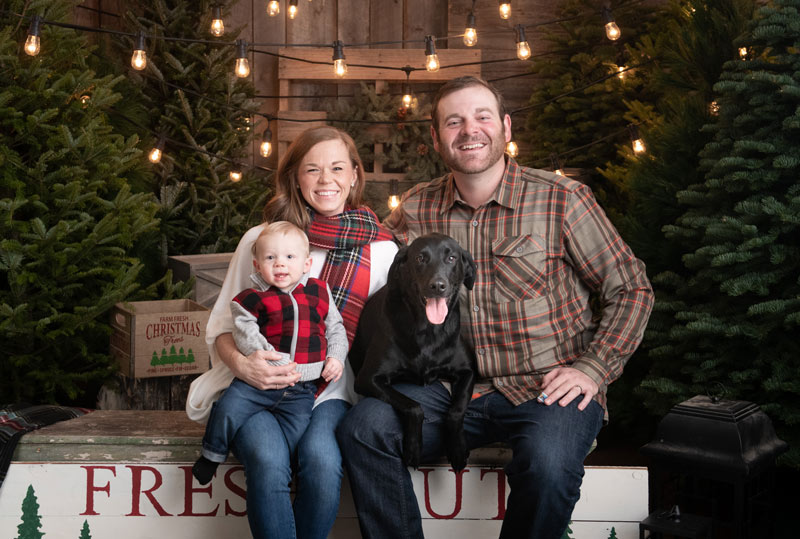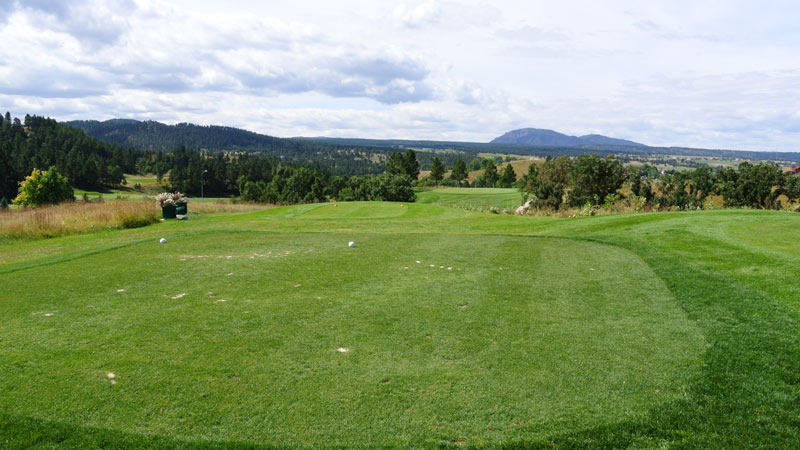
Spearfish Canyon Golf Club lies near the Northern Black Hills in western South Dakota. Nine-year GCSAA member Josh Caffee oversees maintenance of the 18-hole semiprivate course. Photos courtesy of Josh Caffee
Josh Caffee has a young son, another child on the way and a wife who works in the health care industry.
Darned right the ongoing coronavirus pandemic and the rapidly unfolding societal, political, economic and emotional reactions to it are weighing heavily on him.
A look around his maintenance shop convinced him to take action, and earlier this week, he wrote a letter addressed to his “fellow turfgrass men and women” that urged them to keep the greater good top-of-mind.
“I had been debating doing it for a couple of days,” says Caffee, GCSAA Class A superintendent at Spearfish Canyon Golf Club in Spearfish, S.D., of putting his thoughts in writing. “The last straw was when I realized my golf course had more N95 masks than the hospital my wife works at. In South Dakota, we’re not high on the pecking order for the national government. We don’t have adequate tests to see if anyone has COVID-19. So I donated our N95 masks to the hospital, because they don’t have any.”
Caffee posted his letter in the private, 14,000-plus-member Golf Course Maintenance group on Facebook, and in a GCSAA.org forum. In it, he explained his situation, personally and professionally, and, in essence, implored everyone to heed local and state mandates in the face of the coronavirus pandemic, and not to try to skirt stay-at-home orders. He wrote, in part:
I believe it is in the best interest of our golfers, employees, community, and nation to use this time to take a break. Take a break from the tireless efforts we put forth each day to provide the best conditions possible in order to work with our state and local governments to achieve greater good. I believe that we, as turfgrass professionals, have the ability to return our golf courses to the shape that we as professionals expect out of our properties once this crisis has passed.
‘Listen to the professionals’
Caffee expected feedback to be mixed.
“To be honest, for a lot of guys, the golf course is their main priority,” says Caffee, 32, a nine-year GCSAA member. “People I’ve met over the years ... the joke is that the golf course is their baby.”
In his letter, Caffee likened the current situation to, on a much smaller scale, a golfer who insists on playing when there’s frost on the course, despite warnings that doing so could damage the course and limit others’ use of it. “As turfgrass professionals, we sometimes feel people don’t listen to us because it doesn’t help what they’re trying to do,” Caffee says. “I used frost — being a northern guy — as an example.
“I just hope people will listen to the professionals. This isn’t something I’m a professional in. Ten years ago, I probably would have had a different reaction to this. I probably would have laughed in my younger days. But my family is more important than a business.”

Josh Caffee with his wife, Katy; 15-month-old son, Jackson; and dog, Luna. Katy is a nurse at the hospital in Spearfish, S.D.
Public reaction — Caffee’s letter is among the most commented-on recent posts in the Facebook group — has been largely positive. Caffee estimates responses have been 95% supportive, and even those who disagreed did so mostly respectfully. (It’s worth noting that the group is moderated, and rules prohibit disrespectful or disparaging comments.)
“I don’t think anyone has necessarily been mean,” Caffee says. “And that article is just my opinion. Everyone is entitled to their own opinion. I have had several private messages where people have asked if it was OK if they used that article at their own course. I told my wife before I sent it, that’s why I signed my name. I stand behind what I wrote.”
‘We haven’t even told family yet’
Caffee, who is in his 12th year as a superintendent and is heading into his seventh season at Spearfish Canyon GC, grew up in the Black Hills of South Dakota. He has worked on golf courses since he was 14. He and Katy have been married for five years and are the proud parents of 15-month-old Jackson. The couple is expecting their second child in November.
“We haven’t even told family yet,” Josh says. “Or our friends. That’s one reason I deemed it necessary to write that article. That’s an important factor in my and my wife’s mindset. We’ve only known for a couple of weeks, so that absolutely does play into my mindset.”
So, too, does Katy’s profession. A former intensive care unit nurse of seven years, Katy Caffee is a doctor of nursing practice in general surgery at the hospital in Spearfish. Josh describes her role as a go-between for doctors and nurses.
“When she was in ICU, I know she saw a lot of stuff I couldn’t handle, like bad car wrecks,” Josh says. “I’d never before seen her scared to go to work. This is the only time I’ve seen her scared at home, scared to go to work and see patients. ... They don’t know who has it. They don’t have enough tests. It’s a very scary combination, and they don’t have the proper PPE (personal protective equipment). It’s a very trying time in the community.”
As of Tuesday, March 24, South Dakota was among the states that had not instated a stay-at-home order. Caffee estimates Spearfish Canyon GC has had 10 to 15 days of playable golf so far this year. The course’s clubhouse and pro shop are closed, and, “We’ve removed everything off the golf course — anything anyone could touch,” Caffee says. “The only things left are trash cans.”
All potential touch points — flagsticks, bunker rakes — have been pulled, and cups have been inserted upside down, allowing golfers to putt out and retrieve their balls without touching the inside of the cup.
“We weren’t forced to do this,” Caffee says. “We’re doing this for the betterment of the staff. My GM told me, the most important thing is the staff. The golf course will be here when we get back.”

Spearfish Canyon Golf Club is just north of its namesake, the popular Spearfish Canyon, which is home to a National Scenic Byway.
The course recently opened itself to the whole community, no membership required, for walk-only golf.
“We felt it was the right thing to do,” Caffee says. “We’re not asking for donations. We understand people still need to go outside. They need exercise and fresh air and sunlight. We wrote articles about social distancing and not playing in groups. We hope people take advantage of it, but are smart about it. We’re really doing it for the community. We’re a small, tightknit community.”
Because the course is just starting to emerge from winter dormancy, it’s operating with a small staff. Caffee says his team — largely made up of retirees and students from the local high school and Black Hills State University — sometimes doesn’t fill out until May. The current staff is working split shifts and is cognizant of strict cleaning procedures. Each individual is assigned a personal cart.
‘I’d do it again’
Caffee is well aware that, in many ways, his course’s situation is enviable. It’s relatively low-maintenance, and it’s still open, even if it’s not making money.
He says he did not want his letter to come across as sanctimonious, and he wrote that he was not trying to disparage anyone or start a political debate.
“The main thing was, I was just telling people I thought everybody should just follow the guidelines that are put in place,” he says. “It seems like too many people are trying to find ways to skirt around guidelines that are there for the betterment of our society. I understand fully that golf courses are worth a lot of money.
“When this is all done, hopefully we’ll understand this is a real thing that happened to us, in our lifetime. I hope the membership understands that. I hope memberships come back and support their golf courses, but maybe their expectations are going to have to be lowered.
“And I fully understand lots of people are in different situations,” he continues. “I hope no one loses their jobs over this. I don’t want any golf courses to close down permanently. But if you lose your health, you don’t have anything. It’s as big a deal for us if we have 20 members get sick or die because of this as if we shut down. And I know I’m not the only one who works on a golf course and has young children. I’m not the only one who has a spouse who works in the health care industry. But I know there are golf courses in the region that are open like normal. They’re not really implementing anything different. I think that’s asinine.”
Does Caffee regret putting his thoughts out there for the world to see?
“No, absolutely not,” he says. “I’d do it again today and tomorrow and the following day. I really mean this. I’m not trying to belittle people for doing stuff they believe in. But it’s eye-opening for us all. I really believe we’re all really good at growing grass, and I believe we’ll be good at getting the courses back to what we want. But without the health of our communities, it won’t make a difference. Sacrificing some things now for the betterment of our community or our society is what we need to do.”
Andrew Hartsock is GCM’s managing editor.